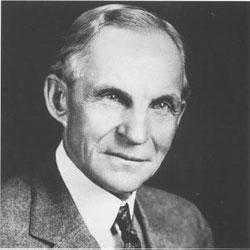American carmaker Ford dominated the American market in the first half of the 20th century, mostly when only one model was sold. Ford, version and gain were boosted by the mass production that was first applied by him. It also made workers' conditions more attractive with higher wages and shorter working hours.
On July 30, 1863, Dearborn / Michigan came to the world as the eldest of six children of a Irish-born farmer. Lost his mother at the age of twelve, Henry spent his spare time in a mechanical workshop he had set himself up. Here he made his first steam machine at the age of 15. He started apprenticeship in a company's atelier in Detroit, and he specialized in repairing pocket watches. He gave up his pocket watches shortly after he planned to produce a great deal of fiya. For the first time in 1882, he had a permanent job as a steam engineer in the south of Michigan.
Six years later she married Clara J.Bryant, daughter of a farmer, and became a child of her. After 1891, he started engineering at the Edison Illuminating Company in Detroit (chief engineer in 1893). In his free time he was working on car production. The first single-cylinder gasoline engine was produced in 1893 at the kitchen of his own home. Three years later he made his first car. At 33, Ford mounted an engine on a chassis that mounted bicycle wheels. The first company, the Detroit Automobile Company, founded Ford Motor Company, which had 25.5% share in its shares on June 16, 1903 when it went bankrupt in 1890, a year and a half after its founding. The first car they produced in the same year was sold in the US. After 1904 he exported his automobiles to other continents.
In the same year, American Ford broke a new world record with its production "999" racing car. T Model Ford, the company's largest shareholder and chairman since 1906, broke a sales record in 1908 with a T-model car that allowed the company to be recognized worldwide. Ford, who was initially suspicious of the idea of offering a single model for sale, shot with the practice in the face of the battle. Ford, which opened the first European branch in England in 1906, sold about 15 million cars in 1927, until the production of the A model went into production. In 1917 the company expanded its production range by adding agricultural vehicles (especially tractors) to its production.
In 1925, he went on to produce passenger and cargo planes for a short time. Ford, who has been running the company with his son Edsel since 1919, bought all of his company's shares at that time. The economic success of the company was not only based on the vehicles offered for sale, but also closely related to Ford's innovations in planning, organization and production. In 1913 Ford brought the mass production line to the auto industry. Ford's idea of reaching a lower cost of production and higher sales numbers through the division of labor and rationalization. At the same time he did not accept union actions in his company with defending shorter working hours and higher wages.

"Fordism" was adopted by many businesses in the following years. After establishing factories in Ford, Belgium (1922), Italy (1923) and Germany (1925), Ford jobs in Europe were managed as a new factory center in England after 1928. In 1932, the Y model, which he drove to the market, was specially designed for European markets. This model, together with the V8 engine developed in 1933, played a decisive role in the development of the company in the following years. Ford, like he had done in the First World War in the Second World War, adapted his operation completely to the production of war. Ford Motor Company is one of the largest companies in the delivery of war material and has earned very good money. Nevertheless, Ford strived to preserve peace before both world wars, and in 1936 it established the Ford Foundation, a foundation aimed at securing peace.

When his son Edsel died in 1943, Henry Ford took over the management of the company again. When most of the orders for armament by the end of the war in 1945 were canceled, Ford passed a record record of peaceful production. In July 1945, the first passenger car came out of the production band. It was the first car produced in the US for three and a half years. Two months later, Ford transferred the management of the company to his grandson, Henry Ford II. Ford, founder of the company, died on April 7, 1947, at the age of 83 at a brain site in his home in Dearborn / Michigan.